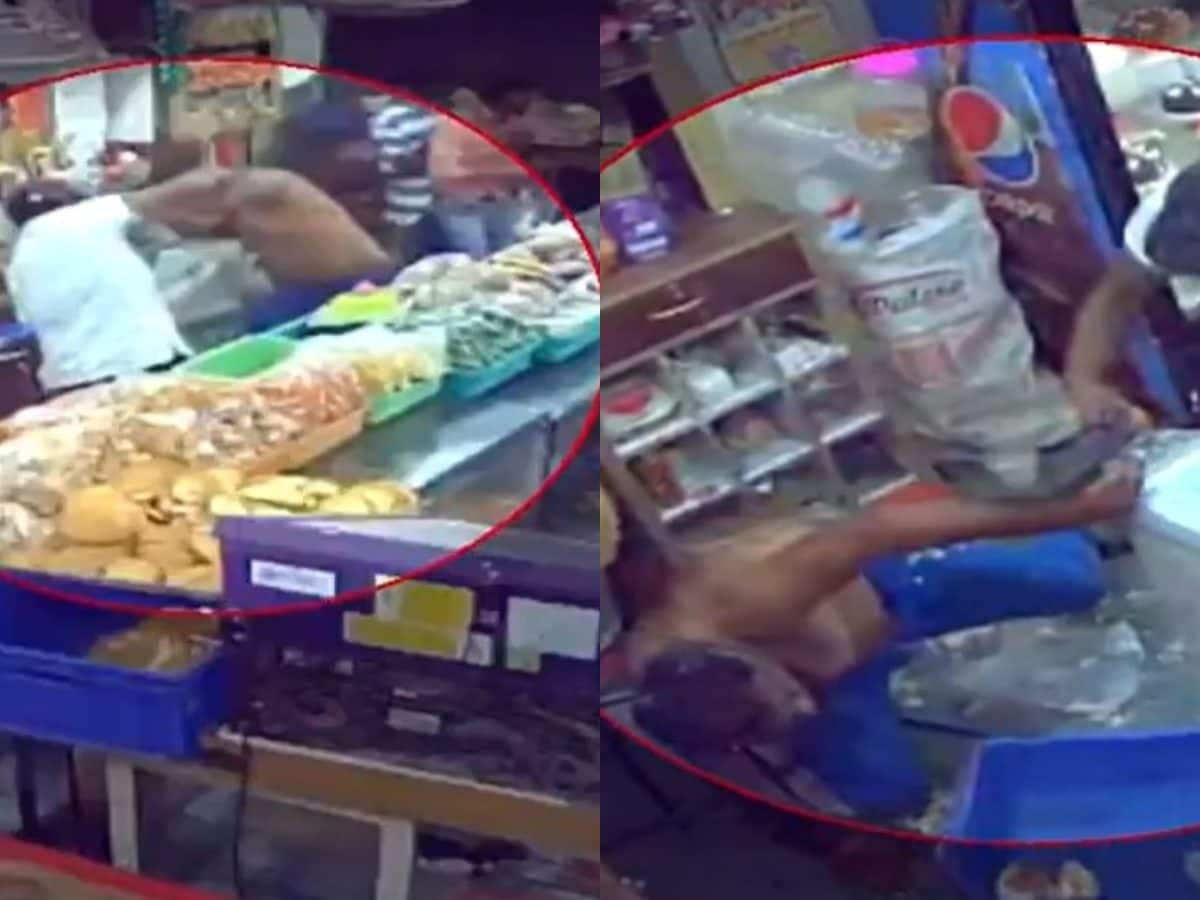BRUTAL MACHETE ATTACKS IN KARNATAKA: MAN HACKED TO DEATH OVER PROPERTY DISPUTE
A chilling wave of violence has gripped Karnataka following a series of brutal machete attacks, with the most recent horrifying incident occurring on May 31, 2025, in Koppal district. A 35-year-old labourer, Channappa Husenappa Narinal, was viciously hacked to death by seven men inside a bakery shop, the attack captured on CCTV and widely circulated, sparking shock and outrage across the state. The attack reportedly stemmed from a long-standing property dispute and old enmity, highlighting deep-rooted social tensions that culminated in this gruesome public murder.
The CCTV footage reveals the victim desperately trying to escape as the attackers chased him inside the bakery, wielding machetes and wooden logs. Despite his frantic efforts, Narinal was repeatedly struck, sustaining fatal injuries before the assailants fled the scene. Police have arrested seven suspects so far, with an ongoing manhunt for others involved. The brutality of the attack, occurring barely a kilometer from a police station, has raised serious questions about law enforcement effectiveness and public safety in Karnataka.
The brutal machete attack in Koppal district has sent shockwaves throughout Karnataka, reigniting fears about the rising trend of violent crimes involving sharp weapons. Experts point out that machetes, traditionally agricultural tools, have increasingly become weapons of choice in personal disputes and communal clashes due to their accessibility and lethality. This trend poses a significant challenge for law enforcement agencies tasked with curbing such violence while maintaining community trust.
In the aftermath of the Koppal incident, police forces across Karnataka have intensified patrols and raids targeting illegal possession of weapons, including machetes. Authorities have also launched awareness campaigns aimed at educating the public about the dangers of weapon misuse and encouraging community members to report suspicious activities. Despite these efforts, critics argue that more systemic reforms are needed to address the root causes of violence.


LAW AND ORDER UNDER SCRUTINY: POLITICAL REACTIONS AND PUBLIC OUTCRY
The gruesome murder has intensified criticism of the state government’s handling of law and order. BJP spokesperson Shehzad Poonawalla publicly condemned the violence, accusing Chief Minister Siddaramaiah and Deputy CM DK Shivakumar of failing to ensure citizen safety. The opposition highlighted a series of violent incidents, including the machete attack and other crimes such as the gangrape in Belagavi, to underscore what they describe as a deteriorating security situation.
Public sentiment has echoed these concerns, with citizens demanding swift justice and stronger policing. The incident has sparked debates on social media and news platforms about the need for improved crime prevention, better community policing, and stricter action against those involved in violent disputes. The government has assured the public of a thorough investigation and crackdown on criminal elements.
The political fallout from the recent machete attacks has further polarized Karnataka’s political landscape. Opposition parties have seized on the incidents to criticize the ruling coalition’s governance, accusing it of negligence and failure to maintain law and order. Meanwhile, the government has defended its record, citing ongoing initiatives to strengthen policing and judicial processes. This political tussle has complicated efforts to present a united front against violence.
Communal tensions exacerbated by machete-related violence have also raised concerns about social harmony in Karnataka. The killing of Abdul Rahiman in Dakshina Kannada, for instance, triggered fears of retaliatory violence and communal unrest. Local authorities responded by imposing curfews and deploying additional security forces to prevent escalation. Community leaders have since called for calm and dialogue to heal divisions and promote peace.
The Karnataka government has announced plans to establish special task forces dedicated to curbing machete-related crimes. These units will focus on intelligence gathering, rapid response, and coordination with local police to dismantle criminal networks involved in violent disputes. Officials believe that targeted enforcement, combined with community cooperation, can significantly reduce the incidence of such attacks.
Psychologists and social workers have highlighted the psychological impact of machete violence on survivors and witnesses. Many experience trauma, anxiety, and fear that affect their daily lives and community interactions. Mental health support services are being expanded in affected districts to provide counseling and rehabilitation, helping individuals and communities heal and rebuild trust.
The increasing use of machetes in violent crimes has prompted calls for stricter regulation of agricultural tools. Some experts suggest implementing licensing or registration systems for the sale and possession of machetes, similar to firearm controls. While controversial, such measures aim to balance legitimate agricultural needs with public safety concerns.


MACHETE VIOLENCE NOT ISOLATED: OTHER INCIDENTS IN KARNATAKA RAISE ALARM
The Koppal murder is part of a disturbing pattern of machete-related violence in Karnataka. Another recent attack involved the murder of Abdul Rahiman, a masjid secretary, in Dakshina Kannada district, where he was assaulted by a group wielding swords, machetes, and rods. This killing triggered communal tensions and led to prohibitory orders and heightened police presence in affected areas.
Such incidents underscore the volatile mix of personal disputes, communal tensions, and easy access to lethal weapons like machetes, which contribute to escalating violence. Authorities face the challenge of addressing not only the immediate law enforcement response but also the underlying social and political factors fueling these attacks.
Legal experts emphasize the need for stricter enforcement of existing laws regulating the possession and use of weapons like machetes. They advocate for comprehensive legislation that includes harsher penalties for illegal weapon carrying and use in violent crimes. Additionally, they recommend fast-tracking cases involving such offenses to ensure timely justice and deterrence.
Victims’ families and human rights organizations have demanded better victim support systems, including counseling, financial assistance, and legal aid. They argue that addressing the trauma and economic impact on victims is crucial for community recovery and preventing cycles of violence. The government has pledged to enhance victim assistance programs but faces challenges in implementation.
Local community leaders have organized peace marches and dialogue sessions to address the underlying conflicts leading to machete violence. These initiatives encourage open communication, conflict mediation, and reconciliation, fostering a culture of non-violence. Early results indicate improved relations in some areas, though sustained efforts are necessary for lasting change.
The media’s role in reporting machete attacks has come under scrutiny, with calls for responsible journalism that avoids sensationalism while informing the public. Balanced coverage can help raise awareness without inciting panic or communal tensions. Training programs for journalists on ethical reporting of violence are being considered by press councils and media organizations.
Finally, experts stress that addressing machete violence requires addressing broader socio-economic issues such as poverty, unemployment, and social exclusion. Investment in education, job creation, and social welfare programs can reduce the conditions that often lead to violent disputes. A holistic approach combining security measures with social development is essential for sustainable peace in Karnataka.


IMPACT ON COMMUNITIES AND THE CALL FOR REFORMS
The machete attacks have left communities traumatized and fearful. Residents in affected districts report a growing sense of insecurity, with many calling for urgent reforms. Civil society groups and activists have urged the government to implement stricter weapon control laws, enhance conflict resolution mechanisms, and invest in community outreach programs to prevent such violent escalations.
Victims’ families, like that of Channappa Narinal, demand justice and rehabilitation support. The public outcry also focuses on the need for faster judicial processes to ensure perpetrators are held accountable promptly, deterring future violence. The state government is under pressure to balance immediate security measures with long-term social reforms to restore peace and trust.
The role of social media in spreading awareness and mobilizing public opinion around machete violence has been significant. Viral videos and eyewitness accounts have brought attention to incidents that might otherwise have gone unnoticed. However, misinformation and sensationalism on digital platforms also risk inflaming tensions, underscoring the need for responsible reporting and fact-checking.
Community policing initiatives have gained renewed focus as a strategy to build trust between law enforcement and local populations. By involving community members in crime prevention and conflict resolution, authorities hope to identify potential flashpoints early and reduce violent incidents. Successful models from other states are being studied for adaptation in Karnataka.
Educational institutions and civil society groups are stepping up efforts to address the cultural and social factors contributing to violence. Programs promoting conflict resolution skills, empathy, and non-violent communication are being introduced in schools and community centers. These grassroots efforts aim to foster a culture of peace and mutual respect over the long term.
Finally, the machete violence crisis in Karnataka highlights the urgent need for a multi-pronged approach combining law enforcement, legislative reform, community engagement, and social development. Only through coordinated action can the state hope to reverse the trend of brutal attacks and restore a sense of safety and justice for all its citizens.
Community awareness campaigns are being launched across Karnataka to educate citizens about the dangers of carrying and using machetes as weapons. These programs involve collaboration between law enforcement, local NGOs, and village councils to promote peaceful conflict resolution and discourage the escalation of disputes into violent confrontations. By empowering communities with knowledge and resources, officials hope to foster safer neighborhoods and prevent future tragedies linked to machete violence.

